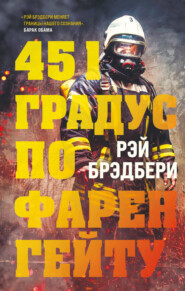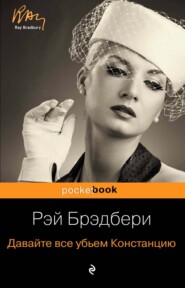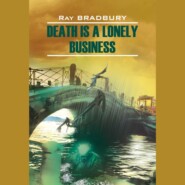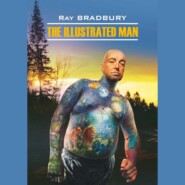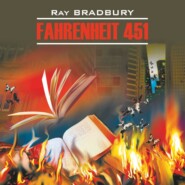По всем вопросам обращайтесь на: info@litportal.ru
(©) 2003-2024.
✖
S is for Space
Настройки чтения
Размер шрифта
Высота строк
Поля
I was a beardless boy-magician who pulled irritable rabbits out of papier-mâché hats. I became a bearded man-magician who pulled rockets out of his typewriter and out of a Star Wilderness that stretched as far as eye and mind could see and imagine.
My enthusiasm stood me well over the years. I have never tired of the rockets and the stars. I never cease enjoying the good fun of scaring heck out of myself with some of my weirder, darker tales.
So here in this new collection of stories you will find not only S is for Space, but a series of subtitles that might well read: D is for Dark, or T is for Terrifying, or D is for Delight. Here you will find just about every side of my nature and my life that you might wish to discover. My ability to laugh out loud with the sheer discovery that I am alive in a strange, wild, and exhilarating world. My equally great ability to jump and raise up a crop of goosepimples when I smell strange mushrooms growing in my cellar at midnight, or hear a spider fiddling away at his tapestry-web in my closet just before sunrise.
You who read, and I who write, are very much the same. The young person locked away in me has dared to write these stories for your pleasure. We meet on the common ground of an uncommon Age, and share out our gifts of dark and light, good dream and bad, simple joy and not so simple sorrow.
The boy-magician speaks from another year. I stand aside and let him say what he most needs to say. I listen and enjoy.
I hope you will, too.
RAY BRADBURY
Los Angeles, California
December 1, 1965
Chrysalis (#ulink_ead7040a-d1ca-531c-bfd2-43cc4f605fc1)
Rockwell didn’t like the room’s smell. Not so much McGuire’s odor of beer, or Hartley’s unwashed, tired smell—but the sharp insect tang rising from Smith’s cold green-skinned body lying stiffly naked on the table. There was also a smell of oil and grease from the nameless machinery gleaming in one corner of the small room.
The man Smith was a corpse. Irritated, Rockwell rose from his chair and packed his stethoscope. “I must get back to the hospital. War rush. You understand, Hartley. Smith’s been dead eight hours. If you want further information call a post-mortem—”
He stopped as Hartley raised a trembling, bony hand. Hartley gestured at the corpse—this corpse with brittle hard green shell grown solid over every inch of flesh. “Use your stethoscope again, Rockwell. Just once more. Please.”
Rockwell wanted to complain, but instead he sighed, sat down, and used the stethoscope. You have to treat fellow doctors politely. You press your stethoscope into cold green flesh, pretending to listen-
The small, dimly lit room exploded around him. Exploded in one green cold pulsing. It hit Rockwell’s ears like fists. It hit him. He saw his own fingers jerk over the recumbent corpse.
He heard a pulse.
Deep in the dark body the heart beat once. It sounded like an echo in fathoms of sea water.
Smith was dead, unbreathing, mummified. But at the core of that deadness—his heart lived. Lived, stirring like a small unborn baby!
Rockwell’s crisp surgeon’s fingers darted rapidly. He bent his head. In the light it was dark-haired, with flecks of gray in it. He had an even, level, nice-looking face. About thirty-five. He listened again and again, with sweat coming cold on his smooth cheeks. The pulse was not to be believed.
One heartbeat every thirty-five seconds.
Smith’s respiration—how could you believe that, too—one breath of air every four minutes. Lungcase movement imperceptible. Body temperature?
Sixty degrees.
Hartley laughed. It was not a pleasant laugh. More like an echo that had gotten lost. “He’s alive,” he said tiredly. “Yes, he is. He almost fooled me many times. I injected adrenalin to speed that pulse, but it was no use. He’s been this way for twelve weeks. And I couldn’t stand keeping him a secret any longer. That’s why I phoned you, Rockwell. He’s—unnatural.”
The impossibility of it overwhelmed Rockwell with an inexplicable excitement. He tried to lift Smith’s eyelids. He couldn’t. They were webbed with epidermis. So were the lips. So were the nostrils. There was no way for Smith to breathe—
“Yet, he’s breathing.” Rockwell’s voice was numb. He dropped his stethoscope blankly, picked it up, and saw his fingers shaking.
Hartley grew tall, emaciated, nervous over the table. “Smith didn’t like my calling you. I called anyway. Smith warned me not to. Just an hour ago.”
Rockwell’s eyes dilated into hot black circles. “How could he warn you? He can’t move.”
Hartley’s face, all razor-sharp bone, hard jaw, tight squinting gray eyes, twitched nervously. “Smith—thinks. I know his thoughts. He’s afraid you’ll expose him to the world. He hates me. Why? I want to kill him, that’s why. Here.” Hartley fumbled blindly for a blue-steel revolver in his rumpled, stained coat. “Murphy. Take this. Take it before I use it on Smith’s foul body!”
Murphy pulled back, his thick red face afraid. “Don’t like guns. You take it, Rockwell.”
Like a scalpel, Rockwell made his voice slash. “Put the gun away, Hartley. After three months tending one patient you’ve got a psychological blemish. Sleep’ll help that.” He licked his lips. “What sort of disease has Smith got?”
Hartley swayed. His mouth moved words out slowly. Falling asleep on his feet, Rockwell realized. “Not diseased,” Hartley managed to say. “Don’t know what. But I resent him, like a kid resents the birth of a new brother or sister. He’s wrong. Help me. Help me, will you?”
“Of course.” Rockwell smiled. “My desert sanitarium’s the place to check him over, good. Why—why Smith’s the most incredible medical phenomenon in history. Bodies just don’t act this way!”
He got no further. Hartley had his gun pointed right at Rockwell’s stomach. “Wait. Wait. You—you’re not going to bury Smith? I thought you’d help me. Smith’s not healthy. I want him killed! He’s dangerous! I know he is!”
Rockwell blinked. Hartley was obviously psychoneurotic. Didn’t know what he was saying. Rockwell straightened his shoulders, feeling cool and calm inside. “Shoot Smith and I’ll turn you in for murder. You’re overworked mentally and physically. Put the gun away.”
They stared at one another.
Rockwell walked forward quietly and took the gun, patted Hartley understandingly on the shoulder, and gave the weapon to Murphy, who looked at as if it would bite him. “Call the hospital, Murphy. I’m taking a week off. Maybe longer. Tell them I’m doing research at the sanitarium.”
A scowl formed in the red fat flesh of Murphy’s face. “What do I do with this gun?”
Hartley shut his teeth together, hard. “Keep it. You’ll want to use it—later.”
Rockwell wanted to shout it to the world that he was sole possessor of the most incredible human in history. The sun was bright in the desert sanitarium room where Smith lay, not saying a word, on his table; his handsome face frozen into a green, passionless expression.
Rockwell walked into the room quietly. He used the stethoscope on the green chest. It scraped, making the noise of metal tapping a beetle’s carapace.
McGuire stood by, eyeing the body dubiously, smelling of several recently acquired beers.
Rockwell listened intently. “The ambulance ride may have jolted him. No use taking a chance—”
Rockwell cried out.
Heavily, McGuire lumbered to his side. “What’s wrong?”
“Wrong?” Rockwell stared about in desperation. He made one hand into a fist. “Smith’s dying!”
“How do you know? Hartley said Smith plays possum. He’s fooled you again—”
“No!” Rockwell worked furiously over the body, injecting drugs. Any drugs. All drugs. Swearing at the top of his voice. After all this trouble, he couldn’t lose Smith. No, not now.
Shaking, jarring, twisting deep down inside, going completely liquidly mad, Smith’s body sounded like dim volcanic tides bursting.
Rockwell fought to remain calm. Smith was a case unto himself. Normal treatment did nothing for him. What then? What?
Rockwell stared. Sunlight gleamed on Smith’s hard flesh. Hot sunlight. It flashed, glinting off the stethoscope tip. The sun. As he watched, clouds shifted across the sky outside, taking the sun away. The room darkened. Smith’s body shook into silence. The volcanic tides died.






